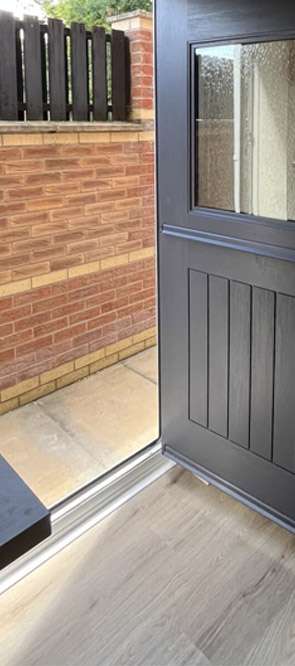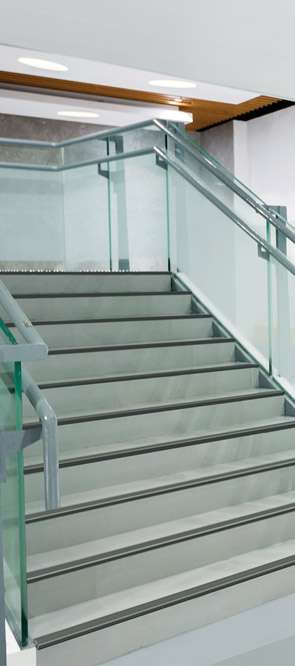
Heavy Duty Stair Nosing Options for High-Traffic Areas: Aluminator vs Aluminium
Ensuring stairway safety in UK commercial and public buildings is far more than a finishing touch — it’s a critical requirement for reducing slips, trips, and falls while meeting accessibility and building regulations. High-traffic environments such as offices, hospitals, schools, retail centres, transport hubs, and civic buildings demand reliable, durable stair nosing capable of supporting safe movement and long-term compliance.
Among the most trusted options on the market today are Aluminator Heavy-Duty Stair Nosings with photoluminescent safety inserts, and a range of traditional heavy-duty aluminium stair nosings engineered for robust performance across multiple flooring types. While both groups offer strength and slip resistance, choosing the right product depends on your building’s environment, safety needs, aesthetics, and budget. This comprehensive guide provides a detailed comparison of all available nosing products in both families — helping facilities managers, contractors, specifiers, and property developers make informed decisions backed by accurate technical insight.
What Makes a Stair Nosing ‘Heavy Duty’?
Heavy-duty stair nosings are designed to perform under conditions where ordinary trims fall short. These environments typically involve:
-
High footfall
-
Frequent wheeled traffic (trolleys, medical equipment, pushchairs)
-
Demanding safety requirements
-
Constant exposure to wear
For a stair nosing to be considered heavy duty, it must deliver excellence in three core areas: material durability, slip resistance, and regulatory compliance.
Key Features to Look for in Heavy-Duty Stair Nosings
1. Superior Material Strength
All heavy-duty nosings in your product lineup are made using premium anodised aluminium, known for:
-
A high strength-to-weight ratio
-
Excellent wear resistance
-
Long-term performance in commercial and public settings
-
Aesthetic versatility with various finishes
This makes the material suitable for demanding locations like hospitals, schools, retail complexes, airports, and train stations.
2. High Slip-Resistance Inserts
Slip resistance is one of the most essential performance metrics in stair nosing selection. Many of your products use:
-
Silicone carbide inserts (extreme grip)
-
PVC anti-slip inserts (comfortable and durable)
-
Ridged anodised aluminium treads (classic grip design)
All options aim to achieve PTV ≥ 36, the UK gold standard for slip safety in wet and dry conditions.
3. Compliance With UK Accessible Design Standards
Regulatory compliance is not optional. Heavy-duty nosings must support:
-
BS 8300: Design of accessible buildings
-
Approved Document M: Building Regulations guidance
-
Equality Act 2010 visual contrast and safety principles
This ensures all users — including those with reduced visibility or mobility — can navigate staircases safely.
Aluminator Heavy-Duty Stair Nosings: Enhanced Safety Through Illumination
Some environments require more than durability and grip — they require visibility in darkness. This is where the Aluminator Heavy-Duty Stair Nosing range excels.
These nosings use photoluminescent technology to provide glow-in-the-dark guidance during power failures, emergencies, or low-light conditions. No wiring. No battery. No maintenance beyond routine cleaning.
The two Aluminator products in your range are:
Aluminator Heavy-Duty Commercial Stair Nosing (68mm x 33mm, Silicone Carbide Insert)
This premium nosing delivers outstanding performance in safety-critical environments.
Key Features
-
Photoluminescent strip glows in the dark after exposure to ambient or artificial light
-
High-grip silicone carbide insert suitable for indoor and outdoor steps
-
Compatible with surfaces including concrete, tiles, steel, vinyl, timber, and checker plate
-
Available in a broad range of insert colours
-
Suitable for both public and domestic applications
Where It Excels
-
Hospitals
-
Schools and universities
-
Cinemas and theatres
-
Care homes
-
Public buildings and evacuation routes
Installation Overview
-
Ensure step surface is clean, level, and dry
-
Mark drill holes
-
Drill and plug steps
-
Apply adhesive to nosing underside
-
Screw into place
-
Fit insert or pip to conceal screws
Tredsafe Aluminium Non Slip Stair Nosing (85mm x 32mm, PVC Insert)
This version offers all the glow-in-the-dark safety benefits of the Aluminator family, coupled with a PVC anti-slip insert.
Key Features
-
Emergency visibility via photoluminescent guidance
-
Slip-resistant PVC insert
-
Quick installation with screws and adhesive
-
Suitable for concrete, timber, tile, vinyl, and metal substrates
-
Affordable and durable for high-traffic areas
When glow-in-the-dark safety is not required, traditional aluminium nosings deliver outstanding performance and a wide range of design options. Your catalogue includes six specialist profiles to accommodate different stair designs and flooring types.
These nosings are ideal for offices, retail, industrial premises, residential conversions, and commercial environments with moderate safety demands.
Non Slip Heavy Duty Aluminium Stairs Nosing for Stair Treads
A high-performance anodised aluminium nosing featuring a ridged anti-slip surface.
Key Features
-
Compatible with wood, laminate, tile, carpet, and vinyl
-
Stylish ridged detailing for increased grip
-
Available in 900mm, 1200mm, and 2700mm lengths
-
Simple installation using screws and plugs
0.9m Aluminium Non Slip Anodised Edge Trim Stair Nosing
A sleek nosing designed for stair finishing and edge protection.
Key Features
-
Anti-slip grooved surface
-
Ideal for domestic and light-commercial installations
-
Anodised aluminium finish
-
Easy installation with provided screws
40mm x 30mm Anti-Slip Anodised Aluminium Stair Step Nosing
Compact, strong, and ideal for a wide range of internal stair applications.
Key Features
-
Grooved anti-slip design
-
Suitable for wood, tile, vinyl, laminate, and carpeted stairs
-
Can be cut easily with a hacksaw
-
Comes with screws and plugs
30mm x 30mm Anodised Aluminium Anti Non Slip Stair Edge Nosing Trim
This versatile nosing offers a crisp edge finish and can be installed with adhesive or screws.
Key Features
-
Available in silver, champagne, and gold
-
Compatible with new or refurbished stairs
-
Cut-to-length compatibility
Anti Non Slip Stair Edge Nosing Trim (900mm x 19.5mm x 20mm)
A slim aluminium nosing ideal for lighter-edge protection.
Key Features
-
Ridges for improved grip
-
Four-screw installation
-
Durable anodised finish
-
Supplied in protective packaging
Anodised LVT Aluminium Stair Nosing for 3mm Flooring
Designed specifically for luxury vinyl tile (LVT) flooring installations.
Key Features
-
Compatible with dryback and click vinyl
-
Available in 2700mm, 2500mm, and 900mm lengths
-
Outer-corner design for a professional finish
-
Includes screws and plugs
Aluminator vs Aluminium (Performance Overview)
Below is a clean, publication-ready table.
Product Family Comparison
| Feature | Aluminator Heavy-Duty Nosings | Traditional Aluminium Nosings |
|---|---|---|
| Slip Resistance | Silicone carbide / PVC inserts (high grip) | Grooved aluminium / PVC inserts |
| Photoluminescent Glow | Yes – emergency illumination | No |
| Suitable Environments | Hospitals, care homes, public buildings, cinemas | Offices, retail, warehouses, residential |
| Compliance Level | Excellent (BS 8300 & Part M) | Good (when contrast applied) |
| Profile Variety | 2 specialist profiles | 6 versatile profiles |
| External Use | Yes | Yes (depending on model) |
| Price Range | Higher | Moderate to low |
| Visibility in Low Light | Outstanding | Standard |
Choosing the Right Stair Nosing: Key Considerations
Selecting the correct nosing depends on several project-specific factors.
Concrete or Timber Stairs
Use surface-mounted aluminium nosing for fast, durable installation.
Vinyl or Tiled Stairs
Choose a recessed or ramp-backed profile for a smooth, flush finish.
Carpeted Stairs
Select thicker or bullnose-style nosings that wrap comfortably over carpet edges.
Industrial or Outdoor Areas
Opt for silicone carbide inserts for maximum slip resistance.
Compliance, Durability & User Safety
Ask these important questions:
Is it compliant?
Does the nosing provide adequate visual contrast, a certified slip-resistant insert, and appropriate tread dimensions?
Will it withstand wear?
Heavy-duty anodised aluminium lasts years — even under harsh commercial use.
Is it suitable for the people using the building?
For vulnerable users or high-risk evacuation routes, photoluminescent nosings offer crucial visibility.
Internal Resource: Explore All Anti-Slip Stair Nosing Options
Browse the full category of heavy-duty stair nosings here:
A more detailed table comparing all eight items in your catalogue.
Full Product Specification Comparison
| Product Name | Insert Type | Photoluminescent | Best For | Lengths Available |
|---|---|---|---|---|
| Aluminator 68×33mm Silicone Carbide Nosing | Silicone Carbide | Yes | Public buildings, hospitals, schools | Custom lengths |
| Tredsafe 85×32mm PVC Nosing | PVC | Yes | Commercial & domestic safety | Custom lengths |
| Heavy Duty Aluminium Nosing for Stair Treads | Aluminium ridged | No | Wood, laminate, vinyl & tile stairs | 900mm–2700mm |
| 0.9m Aluminium Non Slip Edge Trim | Grooved aluminium | No | Light commercial & domestic use | 900mm |
| 40×30mm Anti-Slip Aluminium Nosing | Grooved aluminium | No | Universal stair protection | Custom lengths |
| 30×30mm Anodised Aluminium Nosing | Grooved aluminium | No | New & replacement installs | Custom lengths |
| Anti Non Slip Nosing 900×19.5×20mm | Ridges | No | Slimline stair protection | 900mm |
| LVT Aluminium 3mm Stair Nosing | Grooved aluminium | No | LVT flooring stairs | 900–2700mm |
Conclusion: Choosing the Best Nosing for Your Building
Both Aluminator and traditional aluminium stair nosings offer excellent structural strength, long-term durability, and protection for high-traffic environments. However, the best choice depends on your building’s safety requirements:
Choose Aluminator if:
-
You need emergency visibility
-
Your building has vulnerable occupants
-
You require maximum compliance
-
You manage hospitals, schools, cinemas, or public institutions
Choose Traditional Aluminium if:
-
Budget is a key factor
-
You need multiple profile options
-
Style and finish customisation matter
-
Your installation is in offices, retail, residential, or commercial settings
Investing in the right nosing now ensures long-term safety, compliance, and reduced maintenance costs — creating a safer environment for every user.
For more stair safety solutions, browse our full product range here:

